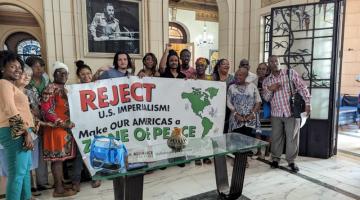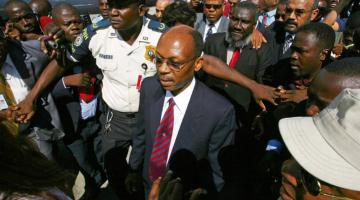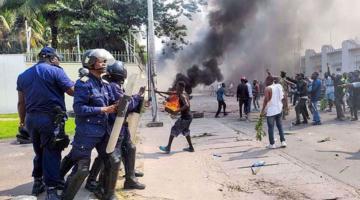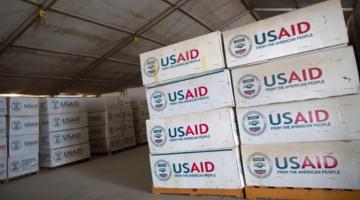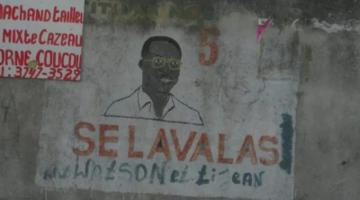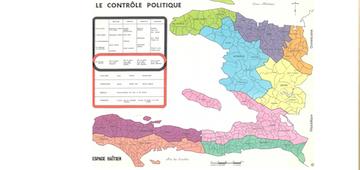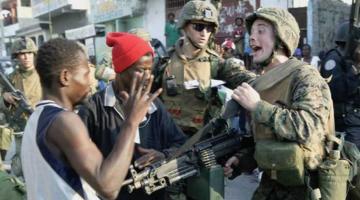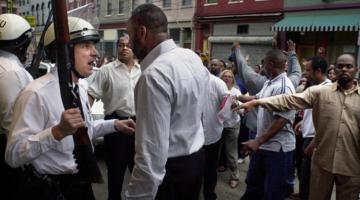CARICOM officials arrive in Haiti in February 2023. Sean Kilpatrick/The Canadian Press via AP
The impending occupation of Haiti by Kenya is supported by the Caribbean Community (CARICOM) with direct assistance in the mission coming from CARICOM states. The question is, why?
Originally published in Stabroek News.
If your knowledge of Haiti is derived entirely from the stories produced by western media outlets, you could be forgiven for believing that the following statements are true:
Haiti, a “failed state” over-run by “gang violence,” can only be returned to stability via the invasion of a foreign military force.
Haiti has a sovereign government with the legal authority to request a military invasion of the country to ‘“fight gangs.”
The United States, in pushing for Kenya and CARICOM nations to lead a foreign armed invasion of Haiti, is acting with the best intentions in Haiti and is committed to securing peace and stability in Haiti and the Caribbean region.
CARICOM is acting in solidarity with Haitian people and supporting Haitian sovereignty.
None of these statements is true. And, in fact, such statements help obscure not only the motivations behind the recent calls for foreign intervention in Haiti, but both the nature of Haiti’s current political-economic reality, and the history of how Haiti got to this moment. Yet the repetition and over-saturation of such claims in the media, even in the Caribbean region, has duped much of the world into cheering for a foreign military intervention in Haiti. The truth is, under the guise of helping Haiti, Haiti’s sovereignty and independence are actually being snuffed out.
So, what is going on in Haiti? Why is the US pushing for yet another foreign military invasion of Haiti? Why are CARICOM countries helping? More importantly, why does Haiti receive so much attention from the United States?
To understand what is going on in Haiti is to understand how consistent the western imperial assault on Haitian people and Haitian sovereignty has been and remains. This assault is reflected in the reality that Haiti is currently under foreign occupation and has been for twenty years. This is no exaggeration.
The only solution to the current crisis in Haiti is the end of the current foreign occupation.
In 2004, Haiti celebrated the two-hundredth anniversary of its independence. In the same year, Haiti’s independence was thwarted by foreign powers. A year earlier, France, Canada, and the US hatched a plot during the meetings of the “Ottawa Initiative on Haiti” ) to overthrow Haiti’s elected government. In the early morning hours of February 29, 2004, the plot unfolded. That morning, President Jean-Bertrand Aristide was kidnapped by U.S. marines and sent to a military base in the Central African Republic. That day, George W. Bush announced he was sending US forces to Haiti to “help stabilize the country,” and by the evening two thousand U.S., French, and Canadian soldiers were already on the ground in Haiti. CARICOM, under the leadership of Jamaican prime minister P. J. Patterson vigorously protested the coup d’état.
The Franco-American-Canadian invasion force targeted and killed Aristide supporters, oversaw the installation of a puppet prime minister, and enabled the formation of a paramilitary force that set up anti-Aristide death squads. The coup was then cleaned up by the United Nations which, under the leadership of the UN Security Council permanent members U.S. and France, voted to dispatch a “peacekeeping” mission to Haiti. The mission was deployed under a “chapter 7” mandate allowing foreign soldiers to use full force against the population. The UN took over from US forces and established the United Nations Stabilization Mission in Haiti (or MINUSTAH) for the tasks of military occupation under the guise of establishing peace and security.
A multi-billion-dollar operation, MINUSTAH had, at any given time, between 6000 and 12,000 military troops and police stationed in Haiti, alongside thousands of civilian personnel. The military wing of the MINUSTAH mission was led by Brazil, which provided the lion’s share of soldiers. However, this multinational military occupation force also contained soldiers from a number of Caribbean, South American, and African countries, including Argentina, Chile, Columbia, Jamaica, Grenada, Benin, Burkina Faso, Egypt, Côte d’Ivoire, Nigeria, Rwanda, Senegal, Guinea, Cameroon, Niger, and Mali.
The UN occupation under MINUSTAH was marked by its brutality towards Haitian people. Civilians were attacked and assassinated. “Peacekeepers” committed sexual crimes. UN soldiers dumped human waste into rivers used for drinking water, unleashing a cholera epidemic that killed between 10,000 and 40,000 people. The UN has never been held accountable for these crimes against Haitian people.
The occupation was solidified through the creation and operationalization of the Core Group. The Core Group is an unelected group of foreigners from Brazil, Canada, France, Spain, the US, Germany that appointed itself as arbiters of Haitian politics. Neither neutral nor passive, the Core Group plays an active, interventionist role in Haiti’s everyday political affairs. It has worked to extend and protect foreign economic interests in Haiti. And it has consistently intervened in Haiti’s sovereign political affairs, often without the collaboration or consent of the Haitian government.
It is claimed that this occupation officially ended in 2017 with the formal draw-down of the MINUSTAH mission. Yet the UN has remained in Haiti through a new office with a new acronym: BINUH, the United Nations Integrated Office in Haiti. Haiti is currently run by a group of non-Haitian foreigners, the Core Group and the BINUH office, the very same people responsible for the destruction of its democracy.
The Core Group occupation is the source of the country’s current predicament. The occupation forces have overseen the complete collapse of the Haitian state while enabling a group of rogue foreigners – countries and corporations, and both non-governmental and multinational organizations – to take over the broken fragments of Haiti’s political economy, largely to serve foreign interests. In fact, it is under this occupation that the US and its allies, France and Canada, installed the neo-Duvalierist Michel Martelly in 2011 in the difficult aftermath of the 2010 earthquake; Martelly’s successor, Jovenel Moïse in 2016; and the current unelected de facto Prime Minister, Ariel Henry, following Moïse’s assassination in 2021.
Under the Core Group occupation, life for the average Haitian has deteriorated. Yet we must also be clear: Haitian people have not taken occupation lightly. One of the most underreported aspects of the current “crisis” in Haiti is the continuous protest of the Haitian people against occupation and for self-determination. The people protested in the hundreds of thousands in 2004 following the removal of Aristide by the US, France, and Canada. They protested the imposition of another illegitimate president, Jovenel Moïse, in 2015 and 2016. They protested the corruption of the US-imposed political party of Martelly and Moïse, PHTK, in 2018 and 2019. And they’ve been protesting the current unelected and de facto US-installed prime minister, Ariel Henry.
For more than two years now, the U.S. has been pushing for a build-up of the military presence in Haiti to protect the puppet government of the unelected and unpopular Ariel Henry. It wants to protect this government in order to continue to control Haiti. In fact, Haiti’s puppet governments have served the U.S. well. For example, it is Ariel Henry who enforced the IMF-backed removal of fuel subsidies for the people, which the US has been pushing for years, and which has pushed the Haitian people into deeper poverty.
Now, the U.S. needs to maintain its control of Haiti as the country is strategically important for its geopolitical aims – the further militarization of the Caribbean and Latin American region in preparation for its confrontation with China and to implement the Global Fragilities Act. Yet the U.S. is not willing to put its own boots on the ground, turning instead, first to Canada, then Brazil, then the CELAC and CARICOM countries–all of whom are reluctant to lead the mission, even if they supported the call for military intervention. The Kenyan government under William Ruto leapt at the opportunity to lead the intervention, bought off by a bag of silver and an approving pat on their neoliberal heads. Haiti will now be invaded by the U.S., but with the Black face of Kenya and CARICOM countries as cover.
Have citizens of Kenya and CARICOM countries asked their governments why the U.S., Canada, or France won’t send their own soldiers to invade and occupy Haiti this time? Have citizens of these countries considered that the unelected de facto “Prime Minister” Ariel Henry has no legal grounds to call for a foreign invasion of Haiti? Have citizens of these countries wondered why the US or UN are not calling for foreign armed invasion of a place like Ecuador where brutal gangs have besieged the country, or Jamaica, with its near-constant state of emergency, or the US itself with its daily mass-shootings? Have citizens of these countries wondered why the US or UN are not calling for foreign armed invasion of Israel as it is committing genocide?
Why Haiti?
We are told that the interest of the U.S. in Haiti is humanitarian, that the U.S wants to protect the Haitian people from “criminal gangs.” Yet U.S. weapons have flooded Haiti, and the U.S. has consistently rejected calls to effectively enforce the UN Security Council resolution for an arms embargo against the Haitian and U.S. elite who import guns into the country. Moreover, when we speak of “gangs,” we must recognize that the most powerful gangs in the country are subsidiaries of the U.S. itself: the United Nations Integrated Office (BINUH) and the Core Group, the two colonial entities that have effectively ruled the country since the coup d’état of 2004. It is this gang, the Core Group and its installed Prime Minister, Henry, who, along with the UN office in Haiti, is insisting on this violent solution to the crisis in the country—a crisis they themselves helped to create.
As Haiti faces another invasion – this time nominally led by Kenya and CARICOM countries – I would like to ask the Caribbean community to think about the vast arsenal at the US empire’s disposal to convince the rest of the world to gladly go along with another strike at Haitian sovereignty. I would also ask the Caribbean community to consider the fact that much of what we hear about Haiti today is a distortion – or an outright fabrication – of Haiti’s social and political reality. Much of it lacks historical context, especially when it comes to the unrelenting meddling of the foreign agents and institutions, for understanding the Haitian situation. Much of it is based in a deep racism that presumes that Black people are ungovernable while resenting the implications of Haiti’s historical commitment to Black freedom.
At the same time, the Haitian community’s continued protests against foreign troops and Western meddling are a testament to their unwavering courage. Haiti is the site of one of the longest struggles in the world for both Black liberation and anticolonial independence. This explains the U.S. empire’s constant reactionary onslaught against the people of Haiti, punishing their repeated attempts at sovereignty with decades of instability designed to secure and expand U.S. hegemony. For two centuries, imperial counterinsurgency against Haiti has aimed to terminate the most ambitious revolutionary experiment in the modern world. The tactics deployed to attack Haitian sovereignty have been consistent and persistent.
With Linda Thomas-Greenfield, the US Ambassador to the United Nations in Guyana this past weekend, reportedly partly to “continue to rally global support for the Multinational Security Support (MSS) mission to Haiti,” we must ask why CARICOM leaders want to participate in the destruction of Haitian sovereignty and people. And we must remember that the “crisis” in Haiti has been created and maintained by the US and its allies. CARICOM countries must stand up against the foreign occupation of Haiti – and not extend the crisis.
Jemima Pierre is an Editor and Contributor to Black Agenda Report and a Co-Coordinator for the Haiti/Americas Team, Black Alliance for Peace.



